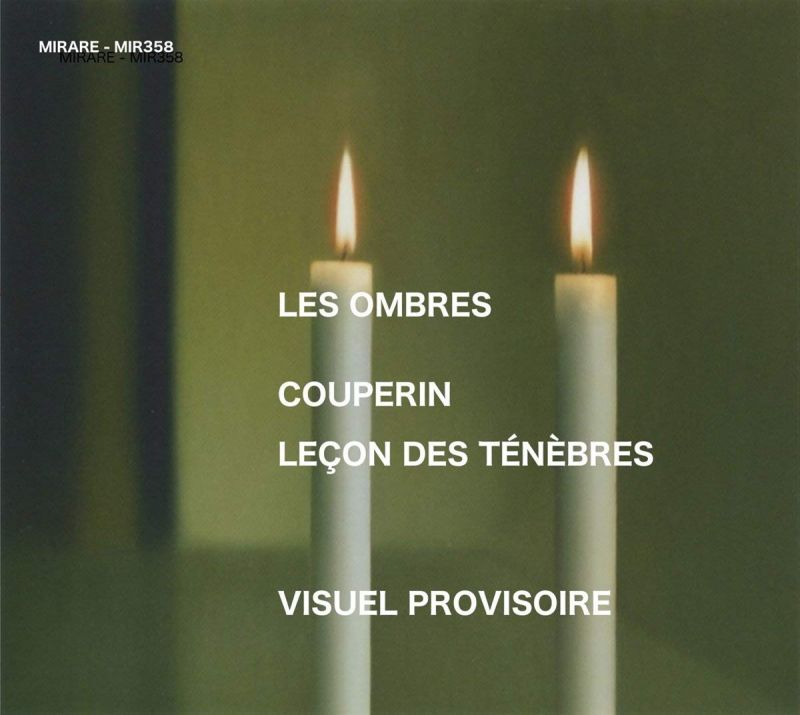COUPERIN Leçons de Ténèbres (Les Ombres)
View record and artist detailsRecord and Artist Details
Composer or Director: François Couperin
Genre:
Vocal
Label: Mirare
Magazine Review Date: 08/2018
Media Format: CD or Download
Media Runtime: 63
Mastering:
DDD
Catalogue Number: MIR358

Tracks:
| Composition | Artist Credit |
|---|---|
| (3) Leçons de ténèbres |
François Couperin, Composer
Anne Magouët, Soprano Benoit Arnould, Bass Chantal Santon-Jeffery, Soprano François Couperin, Composer Les Ombres Margaux Blanchard, Director Sylvain Sartre, Director |
| (4) Versets d'un motet |
François Couperin, Composer
Anne Magouët, Soprano Benoit Arnould, Bass Chantal Santon-Jeffery, Soprano François Couperin, Composer Les Ombres Margaux Blanchard, Director Sylvain Sartre, Director |
| Messe pour les couvents de religieux et religieuse, Movement: Agnus Dei |
François Couperin, Composer
Anne Magouët, Soprano Benoit Arnould, Bass Chantal Santon-Jeffery, Soprano François Couperin, Composer Les Ombres Margaux Blanchard, Director Sylvain Sartre, Director |
| Salvum me fac Deus |
François Couperin, Composer
Anne Magouët, Soprano Benoit Arnould, Bass Chantal Santon-Jeffery, Soprano François Couperin, Composer Les Ombres Margaux Blanchard, Director Sylvain Sartre, Director |
Author: Lindsay Kemp
Both have voices pleasingly suited to this transparent music: Chantal Santon Jeffery, who sings the First Leçon, has the weightier and more dramatic voice of the two, as befits her operatic experience, while Anne Magouët, a singer with a background in more intimate settings, is lighter and a touch more mellifluous in the Second, also managing to incorporate Couperin’s ornamentation more gracefully into the line. And, anyway, it pays to have a recognisable but not too grating difference between the singers in this music, especially when it comes to the Third Leçon, in which they join together in sublime but characterful duet. Les Ombres give variety to the continuo as well, with harpsichord replacing the more usual organ alongside theorbo and gamba in the First and Third Leçons. These are honest and stylish performances of this wondrous music that successfully balance emotional weight and responsiveness to text with elegance and composure.
The couplings here are unusual, including a short liturgical organ piece and four verses of the psalm Mirabilia testimonia tua, in which the singers are joined by flutes and violins in a strangely disparate sequence that begins in the memorable sound world of intertwining unaccompanied sopranos and elsewhere features delicately high-lying continuo. The solo bass motet Salvum me fac Deus, also with violins and flutes and claimed here as a premiere recording, is for Couperin a surprisingly bold and large scale setting in several strongly characterised sections, and is confidently and lithely sung by Benoît Arnould. A rewarding and well-executed look into the often under-appreciated world of Couperin’s sacred music.
Discover the world's largest classical music catalogue with Presto Music.

Gramophone Digital Club
- Digital Edition
- Digital Archive
- Reviews Database
- Full website access
From £8.75 / month
Subscribe
Gramophone Full Club
- Print Edition
- Digital Edition
- Digital Archive
- Reviews Database
- Full website access
From £11.00 / month
Subscribe
If you are a library, university or other organisation that would be interested in an institutional subscription to Gramophone please click here for further information.




